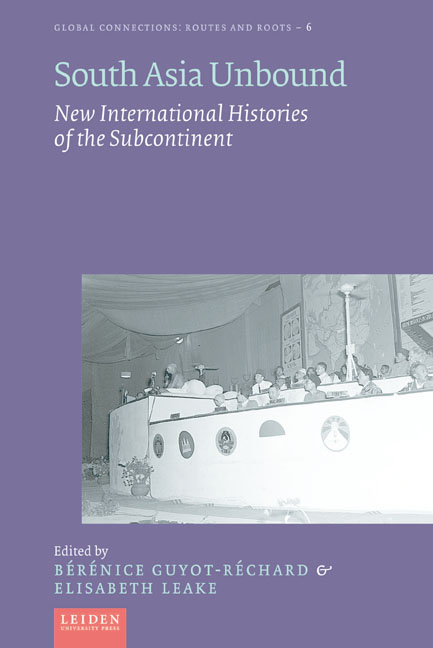Book contents
- Frontmatter
- Contents
- List of Illustrations
- List of Contributors
- Acknowledgements
- Acronyms and Abbreviations
- Introduction. South Asia Unbound
- Part I (Inter)national Orders and State Futures
- Part II From the Transimperial to the International: Lived Uncertainties
- Part III South Asian Roots of the International
- Part IV Ambivalences and Sensibilities of Internationalism
- Afterword
- Index
Chapter 1 - A Thwarted “Westphalian Moment” in South Asia? The Triple Alliance against Tipu Sultan
Published online by Cambridge University Press: 04 January 2025
- Frontmatter
- Contents
- List of Illustrations
- List of Contributors
- Acknowledgements
- Acronyms and Abbreviations
- Introduction. South Asia Unbound
- Part I (Inter)national Orders and State Futures
- Part II From the Transimperial to the International: Lived Uncertainties
- Part III South Asian Roots of the International
- Part IV Ambivalences and Sensibilities of Internationalism
- Afterword
- Index
Summary
Abstract This chapter examines practices of British-South Asian diplomacy and Indian initiatives for inclusive international relations, with a specific focus on the Triple Alliance between the Maratha Confederacy, Hyderabad, and the British East India Company against Mysore (1790-92). It shows both the existence of shared legal principles and the possibility of commensurability between diplomatic frameworks across cultures. These intercultural encounters stand against nineteenth-century narratives that the European international emerged in a unique endogenous evolution into which non-Western polities did not fit. Instead, the chapter argues, the Triple Alliance should be perceived as a thwarted Westphalian moment, in the sense it was a missed opportunity to integrate South Asian and European states into a joint family of nations built around a globally inclusive international law.
Key words: intercultural diplomacy, eighteenth-century India, legal pluralism, treaty making
In February 1792, a sea of tents, divided in three sectors, representing the Maratha Confederacy, Hyderabad, and the British East India Company (EIC), was set up in a camp near the Mysore capital of Sringapatam. This was the Triple Alliance, a joint military campaign set up against the ruler of Mysore, Tipu Sultan. With Tipu's defeat, the ground was prepared for peace negotiations. Hyderabad, the Marathas, and the EIC were very different allies, yet they acted as a united diplomatic front, one that shared a set of normative legal principles in foreign relations. The Alliance cited Tipu's expansionism and his treaty violation as legitimate reasons to go to war, which they agreed upon in a multilateral treaty signed on equal terms. Moreover, the allies pledged to strictly abide by this treaty and agreed not to enter in any separate peace negotiations with Tipu Sultan. A major issue in peace negotiations was whether the Alliance should destroy the defeated dynasty and divide its realm among them. The three parties eventually agreed that Tipu should retain his throne over a considerably reduced domain. Although no party explicitly referred to the concept of a “balance of power,” much indicates that this is what they had in mind.
- Type
- Chapter
- Information
- South Asia UnboundNew International Histories of the Subcontinent, pp. 41 - 60Publisher: Amsterdam University PressPrint publication year: 2023

